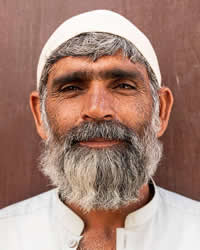Bedouin, Gulf in United Arab Emirates

Photo Source:
Copyrighted © 2026
Kerry Olson All rights reserved. Used with permission |
Send Joshua Project a map of this people group.
|
| People Name: | Bedouin, Gulf |
| Country: | United Arab Emirates |
| 10/40 Window: | Yes |
| Population: | 221,000 |
| World Population: | 221,000 |
| Primary Language: | Arabic, Gulf |
| Primary Religion: | Islam |
| Christian Adherents: | 0.00 % |
| Evangelicals: | 0.00 % |
| Scripture: | Portions |
| Ministry Resources: | Yes |
| Jesus Film: | Yes |
| Audio Recordings: | Yes |
| People Cluster: | Bedouin, Arabian |
| Affinity Bloc: | Arab World |
| Progress Level: |
|
Introduction / History
The name Bedouin is derived from the Arab word “bedu.” It is a term used to differentiate between groups who migrate with their herds and those who settle in urban or agricultural areas. Despite this general understanding, many Bedouins in the UAE historically participate in both nomadic livestock management and farming, fishing and pearl diving. Today, the term Bedouin refers more to ancestry and a specific set of traditional values.
Many people picture the Bedouin as clothed in long flowing robes, riding across the desert on their camels. In reality, very few live are livestock-herding nomads. Since the oil boom started in the 1950s, the government of the United Arab Emirates (UAE) has settled Bedouins in permanent communities, mostly between Dubai and Al Ain, in the Liwa Oasis, and in the Madinat Zayed.
Because citizens and native inhabitants of the UAE have a fairly recent Bedouin past and still strongly share many Bedouin values, it is difficult to draw a line between Emiratis and their Bedouin subset. Most Bedouin are still very aware of their traditional tribal affiliations and ancestry. Virtually all Bedu speak Arabic and claim Arab descent.
What Are Their Lives Like?
The economy of the small number of truly traditional Bedouins is still primarily based on raising livestock. Political borders are of little importance to the Bedouin, although various government restrictions are now having more effect on their migratory lifestyle than in times past.
To endure the extreme heat of the desert, the Bedouin traditionally wore lightweight, light-colored clothing. These were very loose-fitting, allowing for the circulation of air and freedom of movement, yet providing protection from the sun and windblown sand.
The nomadic Bedouins lived in low, rectangular tents woven from camel or goat hair. A line of poles supported the center of the tent. The wealthier a Bedouin was, the longer his tent was. The sides of the tents were rolled up to let the breezes in or closed up tightly during rain or sandstorms. Many Bedouins still use these tents at recreational winter camps they set up in the desert.
The family is the smallest unit, followed by the clan, then the tribe. In the past, it was shameful for a Bedouin to accept a wage-paying job. For this reason, some Bedouins take advantage of government benefits and do not work at all.
What Are Their Beliefs?
While most of the Bedouin are Sunni Muslims (many of the Malikite branch), there is still a basic belief in spirits known as jinnis. According to Arab legend, jinnis are spirits capable of assuming human or animal form and exercising supernatural influence over humans.PRGRPHA few of the tribes have been influenced by the mystic tradition in Islam known as Sufism. A Sufi is someone who believes that he has acquired a special inner knowledge directly from Allah.
What Are Their Needs?
Bedouin groups are basically untouched with the gospel. Although there are resources available in their languages, they have proven to be resistant to the message of Christ and very few are willing to reach them.
Prayer Points
Ask the Holy Spirit to grant wisdom and favor to mission agencies focusing on the UAE's Bedouin.
Pray that the Lord will raise up additional long-term workers to join the few who have already responded.
Ask God to raise up prayer teams who will faithfully intercede for the Bedouin.
Ask the Holy Spirit to complete the work begun in the hearts of Bedouin believers through adequate discipleship.
Pray that God will give Bedouin believers the boldness to share Christ with their own people.
Ask the Holy Spirit to soften the hearts of Bedouins towards Christians so that they will be receptive to the gospel.
Pray for fellowships of Christian believers to be raised up among each of the Bedouin tribes in the UAE.